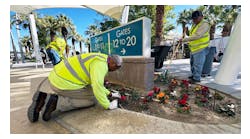Restarting Aviation Critical to UK Economy - Results for the Three Months Ended March 31
Closure of national borders increases COVID losses to nearly £2.4 billion – Heathrow recorded a further £329 million loss in Q1 as only 1.7 million passengers traveled through the airport, down 91 percent compared to Q1 2019. This brings total losses since the start of the pandemic to nearly £2.4 billion. Cargo volumes are also down 23 percent on 2019, underlining how a lack of flights impacts UK trade with the rest of the world.
UK’s summer economic recovery depends on travel restarting from May 17th – While underlying demand for travel remains strong, continuing uncertainty over government policy means Heathrow reduced its passenger forecast for the year to a range between 13 and 36 million, compared to 81 million in 2019. As vaccinations are rolled-out and COVID levels fall, restarting travel to markets like the US will be critical to the UK’s economic recovery and we will be prepared to scale-up our operations as demand returns. Border Force’s ability to provide an acceptable service for arriving passengers remains primary concern surrounding the restart and Ministers will need to ensure every desk is staffed to avoid unacceptable queues.
Safety remains Heathrow's top priority – Heathrow is ready to welcome passengers and has invested to maintain strong COVID-secure standards, becoming one of the first UK airports to pass the CAA’s COVID Security Assurance Scheme as well as securing the Airport Health Accreditation from Airports Council International.
Resilient financial position despite challenges – Decisive management action has protected jobs and the health of the business in the face of unprecedented uncertainty. Heathrow reduced cash burn by 50 percent versus Q1 2020, with a 33 percent reduction in opex and a 77 percent cut in capex. Prudent financing action has increased liquidity by 41 percent to £4.5bn since the start of the pandemic, providing sufficient cover to meet all commitments for at least 15 months even with low passenger volumes.
UK Government’s plan to include international aviation emissions in targets is welcome – Climate change remains aviation’s biggest long-term challenge and the focus on emissions targets is welcome. UK policymakers should now focus on scaling up Sustainable Aviation Fuel (SAF) production in the UK by implementing a SAF mandate of 10 percent by 2030 and at least 50 percent by 2050. They should also use their leadership of the G7 and COP26 to agree a consistent international SAF mandate. Heathrow’s largest airlines have already committed to using a higher level of SAF by 2030 than the Committee on Climate Change’s most optimistic case.
More action needed by CAA to protect consumers and restore confidence in regulation – The CAA’s interim action falls short of what was needed and undermines investor confidence in UK regulated businesses, putting at risk the Government’s infrastructure agenda. The CAA will need to address all the issues related to adjustment fully in the upcoming H7 regulatory settlement to attract the investment needed to maintain service, keep prices lower than they would otherwise be and protect resilience through the recovery.
Heathrow CEO John Holland-Kaye said:
These results show how COVID has devastated the aviation sector and British trade. Restarting international travel from May 17th will help to kickstart the economic recovery, allowing exporters to get their goods to market, as well as reuniting families who have been separated for over a year. Heathrow is gearing up for the recovery. By acting early to cut costs and protect cash, we have put ourselves in a strong financial position to weather the storm and are ready to welcome back passengers, while keeping them safe. This would not be possible without the energy and commitment of my colleagues across Heathrow and I am very proud of what they have achieved.





